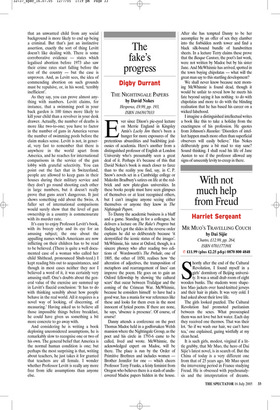The fake’s progress
Digby Durrant
THE NIGHTINGALE PAPERS by David Nokes Hesperus, £9.99, pp. 193, ISBN 1843917033 Ever since Dixon’s pie-eyed lecture on Merrie England in Kingsley Amis’s Lucky Jim there’s been a hunger for more exposures of the pretentious absurdities and backbiting jealousies of academia. Here’s another from a distinguished professor of English at London University who’s presumably seen a great deal of it. Perhaps it’s because of this that David Nokes’s book is much closer to farce than to the reality you find, say, in C. P. Snow’s novels set in a Cambridge college or Malcolm Bradbury’s satires on life at the redbrick and new plate-glass universities. In these books people must have seen glimpses of themselves or at least recognised others, but I can’t imagine anyone seeing either themselves or anyone they know in The Nightingale Papers.
To Danny the academic business is a bluff and a game. Standing in for a colleague, he delivers a lecture on The Rake’s Progress but finding he’s got the slides in the reverse order explains he did so deliberately because ‘it demystified the iconic status of the images’. McWhinnie, his tutor at Oxford, though, is a sincere phoney who after reading two editions of Wordsworth’s The Prelude, one of 1805, the other of 1850, realises how ‘the alteration of adjectives, the transposition of metaphors and rearrangement of lines’ can improve the poem. He goes on to gain an Oxford fellowship by showing ‘the cultural scars’ that occur between Trafalgar and the coming of the Crimean War. McWhinnie, because he considers himself to have had a good war, has a mania for war references like these and looks for them even in the most innocent of lyrical poems. If there are none, he says, ‘absence is presence’. Of course, of course!
Danny attends a conference on the poet Thomas Madoc held in a godforsaken Welsh mansion where the Nightingale Group, as the poet and his circle in 1793-6 came to be called, lived and wrote. McWhinnie, the acknowledged expert on Madoc, will be there. The place is run by the Order of Primitive Brethren and includes women Brother Jennifer for one — which cheers Professor Terry Franks, a feisty feminist from Oregon who believes there is a stash of undiscovered Madoc papers hidden in the house. After she has tempted Danny to be her accomplice by an offer of sex they clamber into the forbidden north tower and find a black silk-bound bundle of handwritten sheets. In a lecture Terry claims these prove that the Basque Cantoes, the poet’s last work, were not written by Madoc but by his sister Jane. And McWhinnie has arrived, spotted in the town buying chipolatas — what will the great man say to this startling development?
We shall never know because next morning McWhinnie is found dead, though it would be unfair to reveal how he meets his fate beyond saying it has nothing to do with chipolatas and more to do with the blinding realisation that he has based his career on a wicked falsehood.
I imagine a distinguished intellectual writes a book like this to take a holiday from the exactingness of his profession. He quotes from Johnson’s Rasselas: ‘Disorders of intellect happen much more often than superficial observers will easily believe.’ Has Nokes deliberately gone a bit mad to stay sane? Sound thinking. I shall read his life of Jane Austen to see if the professor allowed any signs of unseemly levity to creep in there.


























































 Previous page
Previous page